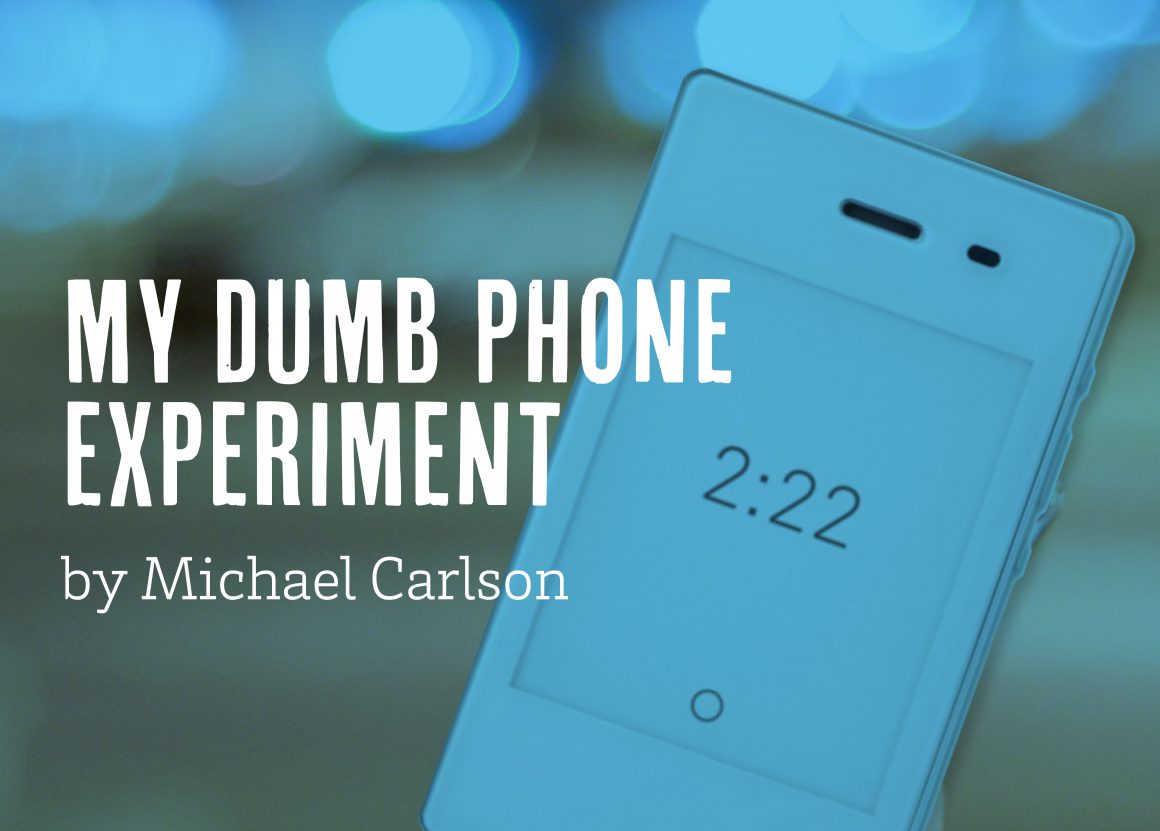Do you remember when you got your first smartphone?
I got mine in the Fall of 2009, and not because I asked for it. As a newly engaged, poor grad student who could barely afford rent, I was more than content with my Sprint flip phone. But when my new employer gave me an iPhone and offered to pay the monthly bill, I was stoked.
In the years that followed, my love for and dependence upon my phone grew. Each new iteration, with all its accompanying upgrades and features, brought a surge of excitement. What I casually called my “phone” was becoming so much more. It was an instrument that enabled me to engage the world in new and exciting ways (google maps, camera, flashlight, 24-hour weather report, FaceTime!).
However, at some point I stopped using my phone as an instrument, which is a tool that requires skill and enhances my creative engagement with the world; instead, I started using it as a device, which is something that does things for me and ultimately diminishes my creative engagement with the world. (For more on instruments vs. devices, click here.) My relationship with my phone became unhealthy.
My Problem
As I’ve shared elsewhere, I’ve become painfully aware of the fact that I have a problem with my phone. My family has helped me see how my addiction has kept me from loving them the way I should. It wasn’t that I was occasionally distracted (we all get distracted); I was captivated. But instead of being captivated by the beautiful faces whom God had put in front of me to love, I was captivated by a glowing rectangle in my pocket.
To be clear, the core problem was never my phone, it was me. Yes, my device was designed by unimaginably sophisticated and well-funded powers seeking to monetize my attention by using persuasive technology to play to my disordered desires (which is why there are more and more voices calling attention to this very thing). But I’m the one who made the hundreds of thousands of micro-decisions that led to where I found myself. Yes, the deck was stacked against me. But I still chose to play the game.
I tried making small changes at first, like putting my phone into “time-out” while at home or “putting my phone to bed” even if I had to stay up late to work. But nothing stuck. These practices never became habits because I was addicted. I realized I needed more than a nudge. I needed a shove. So, like an alcoholic who knows he needs to disrupt his regular patterns of behavior, I needed to do something a little more extreme.
My Experiment
I started researching Dumb Phones (apparently, it’s a growing market). I didn’t want to replace my iPhone. I just wanted to downgrade it. Eventually, I landed on the Light Phone, which is minimal and (notably) does not have an internet browser or app store. After more research and conversation with Signe, I made a plan. So around Thanksgiving of last year, I received an early Christmas present, thus beginning my dumb-phone experiment. Here’s what I did:
I took the sim card out of my iPhone and put it into my Light Phone. In other words, my iPhone ceased being a phone (no more calls or texts). It’s just a little supercomputer now.
I still use my iPhone while at work (Sun-Thurs), just not for calls and texts. But when I leave for the day, I “put it to bed” in my office desk drawer. This means that most of the time that I am home, all I have is my Light Phone.
At the request of my wife, I do bring my iPhone home most weekends (though I don’t use it much).
If we travel anywhere (day-trip to the city, out of town to visit family, etc.), I will pop my sim card back into my iPhone and leave my Light Phone at home.
I don’t know if this will be a forever thing, but I also don’t have an end date in mind. Those who know I’m doing this will often ask me how it’s going. So after nearly three months of this dumb-phone experiment, here are some reflections on what’s been difficult and what’s been good.
What’s been difficult?
The inconvenience for others
I knew this would be inconvenient for me. That was the point. But I hadn’t thought through how inconvenient it would be for my family, which led to some hard conversations in the initial weeks. There I was, thinking I was doing something that would benefit my wife and kids, and yet I had completely neglected to consider the sacrifice this would be for them. Ironically, in some ways, this has made Signe more dependent on her phone. We have adapted, but this was something I had not thought through and it was a hard pill for me to swallow.
My device addiction is not limited to the iPhone
Since I don’t take it home during the week and rarely use it at work, my iPhone screen time has dropped dramatically. How could it not? However, as my iPhone screen time decreased, I noticed that my laptop screen time increased. Yes, I spend less time on screens overall. But I’m MORE tethered to my laptop than I was before. This simply confirms that the problem is not the device, it’s me. If I want Jesus to change me, I’ll have to do more than get a new phone. It turns out that apprenticeship to Jesus is a much slower and deeper process than I prefer.
The obvious inconveniences
The decision to downgrade my iPhone meant going without the myriad of conveniences it offers. What do I miss the most?
- iMessage (this has been the most inconvenient)
- easy texting (the Light Phone is intentionally slow and clunky)
- flashlight (I have stubbed my toes more than once)
- google maps (I have gotten lost more than once)
- camera (I have cute kids, so this one hurts)
- easy video-calling with family and friends (sorry Mom and Dad!)
- buying Starbucks WITHOUT the Starbucks app (which means no rewards)
- having immediate access to a vast amount of information
- twenty-seven other things I can’t think of right now
What’s been good?
More present to my family
Without a doubt, this transition has made me more present to my family. Yes, I still get distracted by things. Yes, I’m on my laptop more than before. However, and I have confirmed this with Signe and our kids, I am more attentive. While Esther and Daniel have complained about not getting to look up random videos or facts, they are quick to say (appreciatively) that I am a better dad without my iPhone. And for me, that makes it all worth it.
I read more
I used to complain about how I don’t get to read as much as I’d like. And while that’s still true, to a point, I’ve read more in the past two-and-a-half months than I did in the first eleven months of 2022. Simply put, my books have less competition now. And that’s good for my soul.
Good conversations
My Light Phone doesn’t look like a phone. So when I use it in public, I regularly get comments from strangers like, “What is that?!” These reactions have led to great conversations with my dentist, Starbucks baristas, and others. We’ve talked about my dumb phone (and this experiment I’m doing), my church (and this initiative we’re doing), and ultimately my faith (and how following Jesus leads me to think deeply about these kinds of things). One young barista couldn’t take her eyes off it and kept asking questions (much to the annoyance of the customers in line behind me). These conversations have been fun and have also confirmed to me that our society craves relief from our digitally bloated way of life.
I’m less attached to my iPhone
As I mentioned above, I still have my iPhone all day in the office and at home on the weekends. However, I have found myself less attached to it. Yes, anytime I travel and therefore start using it as my primary device again, the gravitational pull increases. However, in general, my iPhone does not have the same power it once had over me. And I like that.
What about you?
As I’ve talked with others about my dumb-phone experiment, I’ve tried to be clear about one thing: this isn’t for everyone. I don’t even know how long this experiment will last. But I do know that taking this step was the right thing for me. Despite the inconveniences, it has led to positive change.
But what about you? How’s your relationship with your devices? Are there things you might need to do to put your devices back in their proper place? If you’re wondering what becoming tech-wise might look like for you, consider taking one of these steps:
Do a digital fast for Lent – Lent is a season within the Christian calendar that lasts forty days. This year it lasts from Feb 22 to April 6. It’s a time marked by repentance and confession as we prepare for the joys of Easter. Traditionally, Christians will fast (which means temporarily abstaining from something for a spiritual purpose) during this time. With the season of Lent coming up, I encourage you to try a digital fast. Consider fasting from one of these:
- Social media
- Watching TV / Steaming
- Your phone (try picking a day of the week or certain hours of each day when you do not touch your phone)
In his book, Digital Minimalism, Cal Newport offers a helpful guide for how to do a thirty-day digital fast. He’s not writing from a Christian perspective, so if you are doing this as a spiritual practice, I recommend seeking supplemental resources as well. But the basic framework he provides is helpful. One important note about fasting, if you’re going to take away something (e.g. Instagram), be sure to intentionally add something else (prayer, Scripture, etc.).
Read a book – Maybe the best step to take for you might be to learn from others. Here are a few books to get you started:
- The Tech-Wise Family and My Tech-Wise Life (the two books that inspired Park’s Tech-Wise Initiative)
- Digital Minimalism
- Amusing Ourselves to Death (a little dated, but a classic)
- Twelve Ways your Phone is Changing You
Not into reading? Watch something – Wanna learn more about becoming tech-wise? Here are a couple of videos worth your time:
- How a handful of tech companies control billions of minds every day (Tristan Harris TED Talk)
- The Social Dilemma (Docudrama)
Try a Dumb Phone – Again, this is not for everyone. But if you are considering taking this move, here’s a good place to start.
And don’t forget to register today for the Tech-Wise event on Friday, March 10th from 6:30 pm to 8:30 pm, with our special guest Amy Crouch, author of My Tech-Wise Life, as we start the conversation of navigating this digital world together with wisdom.
Childcare will be available through 5th grade and children/youth in 6th grade and up are encouraged to attend. You can register here.
Grace and Peace,
Michael Carlson


